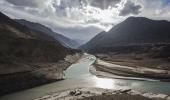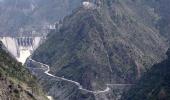India has issued a notice to Pakistan for modification of the Indus Waters Treaty of September 1960 following Islamabad's "intransigence" on its implementation, stressing that the neighbouring country's actions have adversely impinged on the provisions of the pact.

The notice was issued on Wednesday.
Notably, in its report tabled in August 2021, a parliamentary standing committee recommended renegotiating the Indus Waters Treaty to address the impact of climate change on water availability in the river basin and other challenges which are not covered under the agreement.
Indus River System
The Indus system of rivers comprises the main river along with its five left bank tributaries, namely the Ravi, the Beas, the Sutlej, the Jhelum and the Chenab. The right bank tributary, the Kabul, does not flow through India.
The Ravi, the Beas and the Sutlej are together called eastern rivers while the Chenab, the Jhelum and the Indus main are called western rivers. Their waters are critical to both India and Pakistan.
Indus Waters Treaty
At the time of Independence, the boundary line between the two newly created countries -- Pakistan and India -- was drawn right across the Indus Basin, leaving Pakistan as the lower riparian and India as the upper riparian.
Two important irrigation works, one at Madhopur on the Ravi river and the other at Ferozepur on the Sutlej river, on which the irrigation canal supplies in Punjab (Pakistan) had been completely dependent, fell in the Indian territory.
A dispute thus arose between the two countries regarding the utilisation of irrigation water from existing facilities.
Negotiations held under the International Bank for Reconstruction and Development (World Bank) culminated in the signing of the Indus Waters Treaty in 1960.
The treaty was signed in Karachi by Field Marshal Mohammad Ayub Khan, the then President of Pakistan, Jawaharlal Nehru, the then Indian Prime Minister, and W A B Illif of the World Bank on September 19, 1960, with its effective date being April 1.
The treaty contains a preamble, 12 articles and eight detailed annexures.
It provides India an absolute control of all the waters of eastern rivers of the Indus -- Ravi, Sutlej and Beas.
Pakistan shall receive for unrestricted use all those waters of the western rivers -- the Indus, Jhelum and Chenab -- which India is under obligation to let flow beyond the permitted uses.
According to the treaty, all the waters of the eastern rivers with average annual flow of around 33 million acre feet are allocated to India for unrestricted use, while the waters of western rivers with average annual flow of around 135 MAF is allocated largely to Pakistan.
However, India is permitted to use the waters of the western rivers for domestic use, non-consumptive use, agricultural and generation of hydro-electric power.
The right to generate hydroelectricity from the western rivers is unrestricted subject to the conditions for design and operation of the treaty.
India can also create storages up to 3.6 MAF on the western rivers, the pact states.
The treaty also enables India and Pakistan to establish a permanent post of Commissioner for Indus Waters.
The two commissioners constitute the permanent Indus commission.
Unless either government should decide to take up any particular issue directly with the other, each commissioner will be the representative of his government for all matters arising out of this treaty.
The commission enables to establish and promote cooperative arrangements for the treaty implementation, furnish or exchange of information or data provided for in the treaty, promote cooperation between the parties in the development of the waters of the Indus system.
It also examines and resolves by agreement any question that may arise between the two countries concerning interpretation or implementation of the treaty.
The commission is required to meet regularly at least once a year, alternately in India and Pakistan, and also when requested by either commissioner. The commission is also required to undertake tours of inspection of the rivers and works for ascertaining the facts connected with various developments and works on the rivers.
To enable Pakistan to satisfy itself that India's planned projects are within the treaty provisions, India is required to communicate to Pakistan, in writing, their information specified in the treaty.
Pakistan can raise objections within three months of its receipt.
If the commission is unable to resolve a specific problem, provisions have been made for reference to a neutral expert.
It also provides for the provisions of the pact to continue in force until terminated by a duly ratified treaty between the two governments.









 © 2025
© 2025